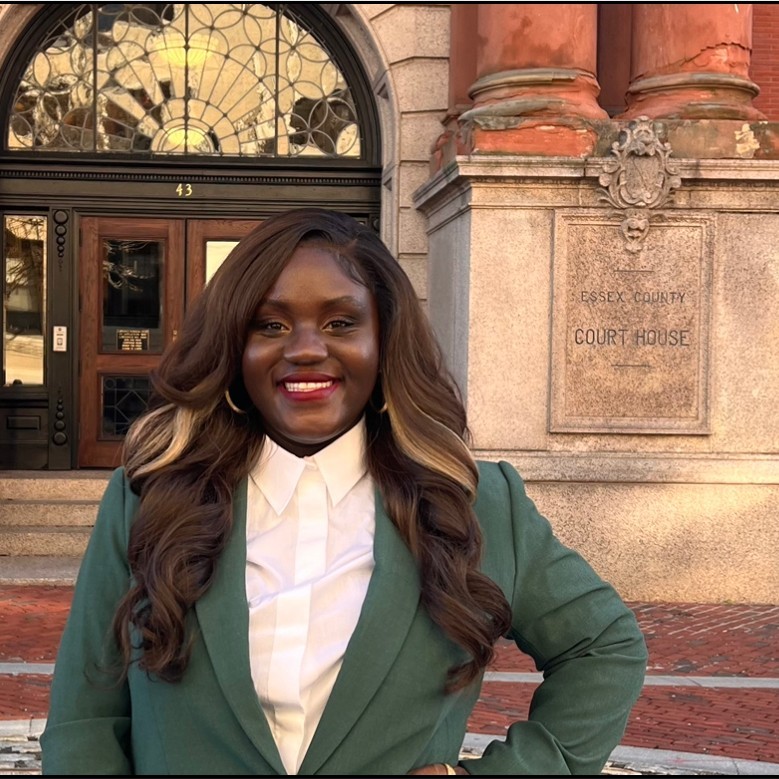
Chelsea Kamuene. Courtesy photo.
“What’s your dream job?”
Most people, when asked this question, name a profession. Chelsea Kamuene, MSW’21, describes her ideal working environment.
“It’s a place where all women feel seen, heard, and encouraged to do more,” she says, noting her intention to amplify the voices of Black women no matter where her career takes her. “It’s a place where we’re able to uplift each other, where our social and emotional needs are taken into consideration.”
Kamuene honed this approach to her career in the macro program at the Boston College School of Social Work, where she learned how to address complex challenges within communities, organizations, and systems.
One of her most formative experiences came as an intern for the Office of Health Equity and Inclusion at Boston Children’s Hospital, where she conducted a yearlong study to better understand how social workers take stock of the nonmedical factors that influence patient health. These factors, known in social work as the social determinants of health, include racism, education, air quality, access to nutritious food, and safe housing.
“My practicum at Boston Children’s Hospital opened my eyes to understanding the world in a different way,” says Kamuene. “It helped me see that the issues on the surface often tend to be symptoms of something more.”
After graduating, Kamuene parlayed her practicum into a full-time role at a nonprofit dedicated to advancing equity in K-12 education in Massachusetts. As a policy and advocacy coordinator for Mass Insight Education & Research, she recently helped inform the language of two bills that, if passed, would require in-state colleges to award course credit to high school students who earn a score of three out of five or higher on advanced placement exams. Now, students must receive a four or five to receive transfer credit.
Over the past seven months, Kamuene has also been analyzing education policies and programs to pinpoint what marginalized students in grades K-12 need to excel in college and beyond. She’s carrying out this work as part of a yearlong Massachusetts Education Policy Fellowship, a professional development program that brings together teachers, school administrators, researchers, nonprofit leaders, and state officials to create a more equitable education system.
“When I was a student at BC, I learned that there’s more than meets the eye when it comes to making sure that a student is successful academically,” says Kamuene. “And I think my social work degree has allowed me to see that so many social factors affect that outcome.”
“Social workers have a lot of transferable skills. Sometimes we tend to undermine ourselves, and I think that we need to be more proud of being social workers because we’re able to fit into so many roles.”
Kamuene initially planned to go to law school after earning a bachelor’s degree in political science and government from Suffolk University in 2019. But, after careful consideration, she realized that she needed to learn more about people—and the complex social problems that often prevent them from reaching their full potential—before pursuing a law degree.
“As a law and public policy major, I felt a disconnect between the legal system and the people who are represented within the legal system,” she says. “So I decided to go into social work to understand the person before pursuing a legal career.”
As a macro student at BCSSW, Kamuene took courses focused on leadership, community engagement, and social innovation, among other topics. In Public Health Social Work, she studied air quality in cities with public transportation systems. In Creating the Inclusive Workplace: Concepts in Organizational Justice, she learned the ins and outs of ethical business practices that are at once innovative, cost-effective, and just. And in The Social Welfare System, she developed a strong understanding of policy and how it impacts the day-to-day experiences of the communities that mean the most to her.
Kamuene’s mentor, Assistant Professor Samuel Bradley, Jr., says her experiences at BCSSW exemplify what’s possible for MSW students in the macro program. “Our program, from the beginning, is designed to give students a strong understanding of populations we work with, especially our priority populations, which are the Black and Latinx communities,” he says. “You develop quantitative and qualitative skills, and even while focused on the macro perspective, you develop strong skills in psychosocial pathology to bring with you when doing community-level work that requires somebody who is as multi-talented as Chelsea.”
As she works to improve K-12 education, Kamune is also studying for the Law School Admission Test and volunteering as a member of the Essex County Commission on the Status of Women. Her role on the commission, which includes working with Sen. Joan B. Lovely to encourage equitable and diverse representation on public boards in Massachusetts, aligns with her long-term goal to amplify the voices of women no matter her job.
“Social workers have a lot of transferable skills,” she says. “Sometimes we tend to undermine ourselves, and I think that we need to be more proud of being social workers because we’re able to fit into so many roles.”


